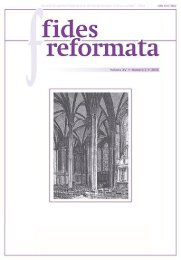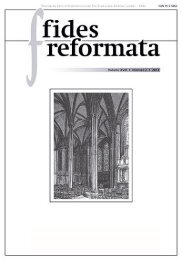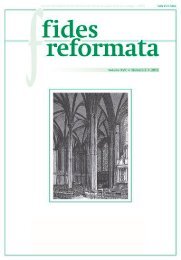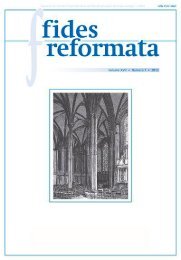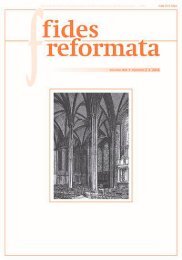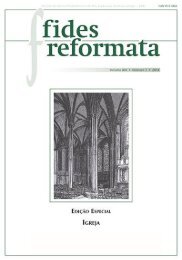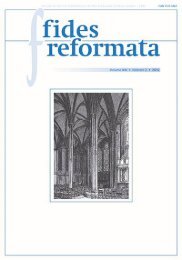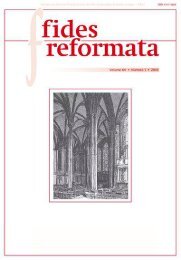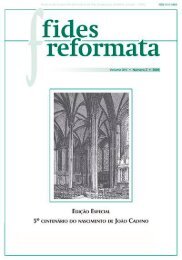You also want an ePaper? Increase the reach of your titles
YUMPU automatically turns print PDFs into web optimized ePapers that Google loves.
Breno Mace<strong>do</strong>, Covenant Theology in the Thought of John Calvin<br />
“In making the covenant, God stipulates for obedience, on the part of his<br />
servant.” 49 The reformer obviously recognizes that the first patriarch would<br />
receive the blessings of the covenant upon his faithfulness in keeping its<br />
conditions. In the Institutes, Calvin explains the exclusion of Ishmael and<br />
Esau from the Abrahamic covenant due to their disobedience to the terms<br />
of the pact. He affirms: “By their own defect and guilt, I admit, Ishmael,<br />
Esau, and the like were cut off from a<strong>do</strong>ption. For the condition had been<br />
laid <strong>do</strong>wn that they should faithfully keep God’s covenant, which they<br />
faithlessly violated.” 50 It is important to note that the idea of condition in<br />
the covenant of grace has not always been accepted in the reformed camp.<br />
Anthony Hoekema explains that the theologian Herman Hoeksema and the<br />
historian Perry Miller insisted in the absence of this concept in Reformed<br />
and Puritan theology. Hoekema confirms, nonetheless, the presence of this<br />
element in Calvin’s thought and explains:<br />
Calvin insists that man has conditions to keep in the covenant of grace; but<br />
holds that we can only keep these conditions through God’s strength, and that<br />
keeping these conditions involves no merits on our part, since our works are<br />
always imperfect. 51<br />
The existence of a conditional element in the Abrahamic covenant demands<br />
an explanation of Calvin’s view of justification in this particular dispensation.<br />
Calvin elaborates on Abraham’s faith and justification in his comments on<br />
Genesis 15. In his explanation of the expression “and he believed in the Lord”,<br />
Calvin affirms that righteousness is imputed to Abraham apart from his personal<br />
justice. 52 But why is righteousness imputed to Abram? Because of his<br />
faith, Calvin explains. He affirms that “the righteousness of the most perfect<br />
characters perpetually consists in faith; since Abram, with all the excellency<br />
of his virtues, after his daily and ever remarkable service of God, was, nevertheless,<br />
justified by faith.” At this point, Calvin associates becoming righteous<br />
with justification, and describes it in terms of a<strong>do</strong>ption and reconciliation. 53<br />
49 Calvin, Commentaries on Genesis, 1:443.<br />
50 Calvin, Institutes, 1:929.<br />
51 Anthony A. Hoekema, “Calvin’s Doctrine of the Covenant of Grace,” Reformed Review 15, n. 4<br />
(May 1962): 9.<br />
52 “Just as we understand that they to whom iniquity is imputed are guilty before God; so those<br />
to whom he imputes righteousness are approved by him as just persons; wherefore Abram was received<br />
into the number and rank of just persons, by the imputation of righteousness… Therefore, they foolishly<br />
trifle who apply this term to his character as an honest man; as if it meant that Abram was personally held<br />
to be a just and righteous man.” Calvin, Commentaries on Genesis, 1:405-406.<br />
53 “Therefore, we <strong>do</strong> no say that Abram was justified because he laid hold of a single word,<br />
respecting the offspring to be brought forth, but because he embraced God as his Father. And truly faith<br />
100





